Part 8: , part 3
Chapter 3, part 3
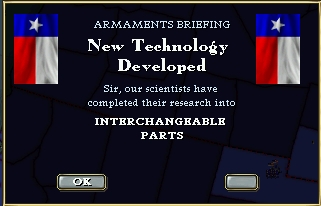
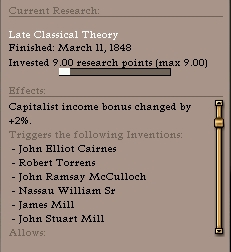
Interchangeable Parts is completed, and we turn to the study of economic ideas, specifically Late Classical Theory, which will open the ideas of some very influential economists to the Republic.
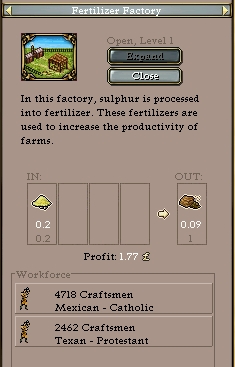
The fertilizer factory in Texas is completed, and we educate some farmers to begin work there. Since we produce the sulphur ourselves, this factory will be as valuable (if not slightly more) as the regular clothes factory, even though regular clothes fetch almost twice the price as fertilizer on the world market.
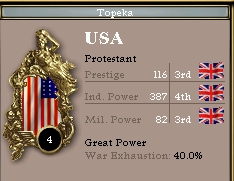
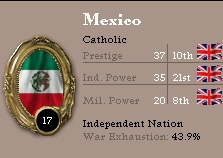
The war is dragging for the US and Mexico, and their populaces are tiring of it. It is not likely that it will last much longer; the American populace in particular has a low tolerance for drawn out wars, even if it is winning.
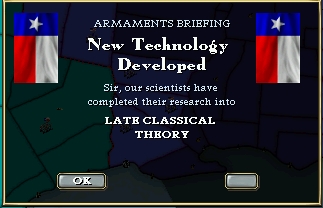
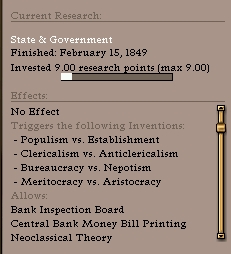
The study of Late Classical Theory is done, and study in the realm of State and Government is begun. The ideas brought from this study will shape future politics in Texas.
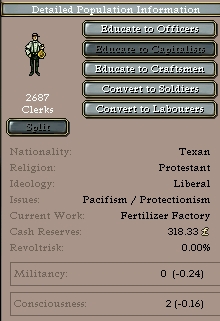
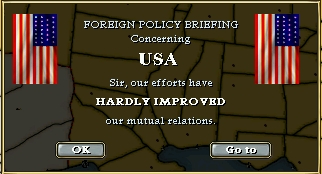
We decide to educate more of the citizens to work in our factories, this time in Dallas. Though a factory could be staffed entirely by craftsmen, employing clerks will increase the efficiency of the factory drastically. Also, we continue to send envoys to the US to attempt to better relations between America and the Republic, but it is not going as well as was hoped.
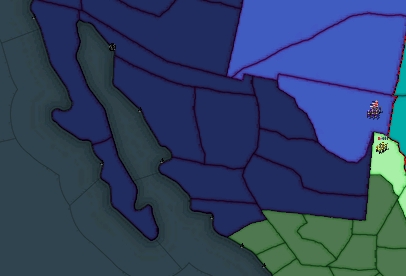
America pushes into the interior of Mexico, who is falling like a house of cards. The only successful defence they have been able to mount is in El Paso; perhaps they have kept most of their forces near Mexico city, in hopes of defending it against the American onslaught.
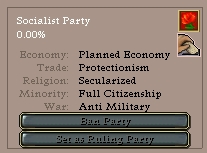
A new party has appeared. They have less voters than the anarcho-liberals though, so we ignore them for now.
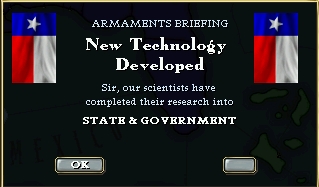
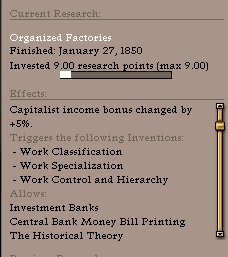
State & Government is completed, and the study of Organized Factories begins. Hopefully this economic research will benefit our fledgling industrial economy.
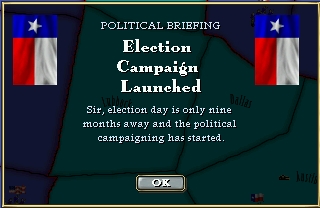
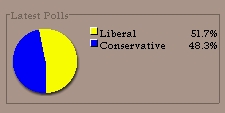
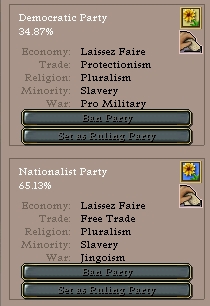
And the third election of the great Republic of Texas begins! The polls look very similar to last time; the Democrats have a slight chance of pulling out a win, but most bets are on the Nationalists, who are running Sam Houston as their presidential candidate.
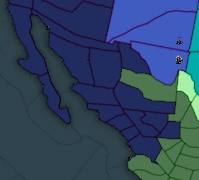
The Americans continue down the Mexican Pacific coast. It will not be long before they are in sight of Mexico City.
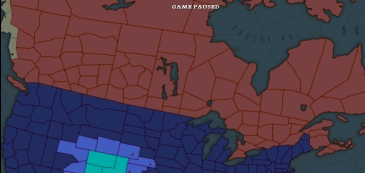
The British have taken control of the entirety of Canada. The last frontier in America is now an insignificant chunk of Alaska called Ft. Yukon, and it is rumored that the British may beat the Russians to it. We send another envoy to the US, again to encourage friendship among the United States and Texas. On a continent of a few large countries, a neighbor-ally is invaluable.
During this 3rd election process, certain ideas are taking root in Texan politics and government. Ideas that will shape politics for the Republic for years to come.

Nepotism was present in the politics of the Republic from the very beginning, and at this point appointing your friends and relatives to government positions is practically a tradition.

The tradition European aristocracy is not present in Texas, and the idea that each man must make his own forture is part of the Texan identity and culture.

The Republic of Texas is firm on the separation of church and state, even more so than America. The religious are certainly not unwelcome to live here, but in the realm of politics, the current government is firm that religion must stay out.
The last question to face the Republic is that of Populism versus Establishment, or issues versus ideology. The Republic takes up the notion of Populism, that every man should vote not for parties but for what they believe matters most. This will lead to many shifts in the power of the political parties, because the populace feels no particular attachment to any one, but will vote for the one that promises to change things they care about.
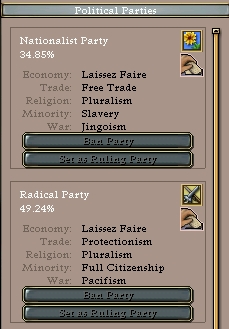
Already this new way of thinking has altered the prospects of the Republic. The Radicals have gained nearly half the entire vote, after being the laughing stock of Austin in the last two elections. The Nationalists are polling 35%, but Sam Houston's clout could still carry the conservative party into power. The election has certainly become more interesting.

A wellspoken young craftsman in Texas has been stirring up crowds. Though the Socialist party still polls at only a fraction of a percent, the ideas of the demagogue have shifted opinions in Texas.
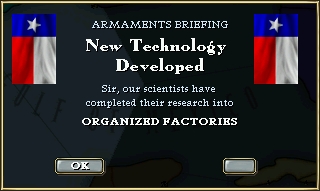
Organized Factories is completed, and we begin research on Cheap Iron, which will be a big step towards the next advancement of railroad technology.
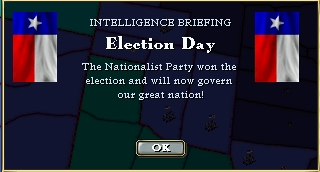
Sam Houston has won re-election, and even in his drunken stupor he can hardly believe it himself considering the numbers that the polls were producing for the Radicals only months ago. His inaugural speech is basically a reiteration of his first inaugural speech, paired with welcoming the Socialist Party and congratulating the Radicals for being able to suddenly appear on the political scene and put up a decent fight for voters. The Democrats grumble, because the Socialists and Radicals draw voters away from the Democrats, and Houston knows this.
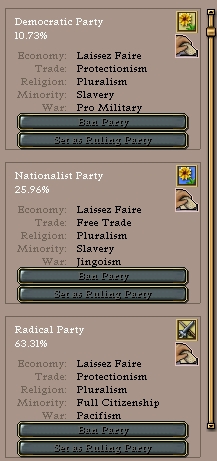
Rumors about the circumstances of Sam Houston's election begin to circulate, largely due to post-election polls that show the Radicals with a clear majority (largely due to their pacifist stance), but nothing comes of it. The Radicals are patient and willing to wait another 4 years. If the polls from now until the next election do not fluctuate much, a victory for the anarcho-liberals is assured.

In the United States, Henry Clay and his Whig Party are given another 4 years. Less than a week after his re-election, Henry Clay signs what is being called the Treaty of 1850. The Mexicans cede New Mexico, Utah, Nevada, slightly more than half of California and most of Arizona (they did not cede an are containing the small town of Lee's Ferry; we do not know why the Mexicans refused to cede a parcel of land that is now entirely surrounded by American territory) . US President Clay is proud of the peace he was able to broker, and America is happy to welcome back its men.
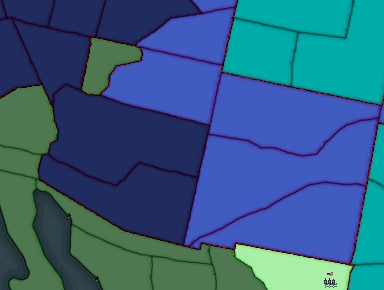
The peace does not alleviate Texans, who now feel boxed in by America.
The public is beginning to ask how President Houston can hope to accomplish his Pacific goal, and Sam is quick to respond to public concerns. President Houston reveals that since the last half of President Lamar's term, the Nationalits have been in negotiations with Henry Clay and the Whigs to arrange the exchange of Colorado for some of the southwestern provinces taken from Mexico. There are going to be two exchanges over a short time period.
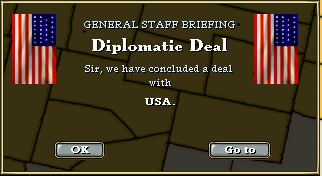
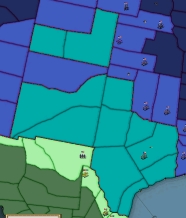
The first deal is signed by Houston. Denver is exchanged for the cities of Albuquerque and Roswell in New Mexico. The next exchange is due to occur within two months.

Before then, a diplomat arrives from Mexico to talk about Mexican-Texan relations, but makes little progress.
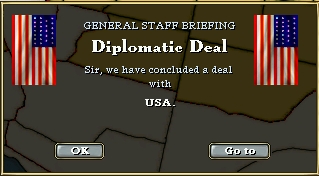
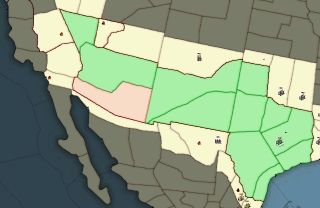
The second exchange is completed. Pueblo and Grand Junction are given in return for the towns of Phoenix and Tucson and the small mining city of Las Vegas. Little is seen of President Houston at the treaty ceremonies, which is surprising considering the free liquor (his idea). Another Mexican delegation arrived to better relations, and Houston is paying them much attention this time around. Colored red on the map is the province of Tucson, which has been experiencing difficulties with the Pueblo indians that are native to the area.
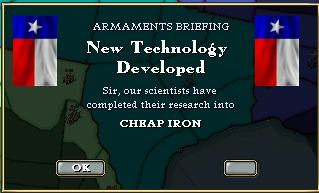
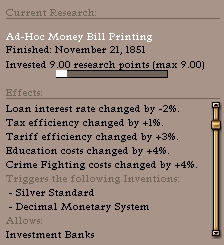
Cheap Iron has been reseached, and the study of a method of pringting money bills begins.
Months after the Colorado trades, Sam Houston comes public with news that stirs the Republic.
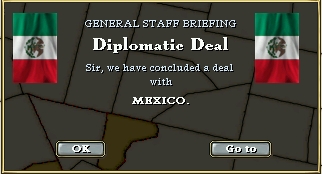
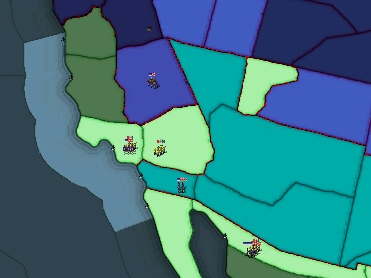
The flag of the Lone Star Republic flies over the city of San Diego. After being convinced of the worth of Texas's knowledge of railroad technology, Mexico gave Texas its window to the Pacific. President Houston's promise to the young republic has been achieved.